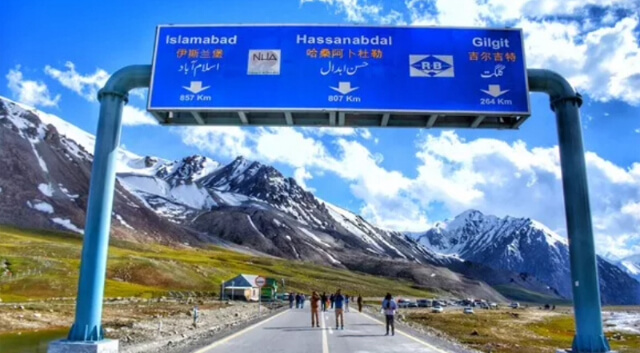By: Maqsood Shahi

Gilgit-Baltistan, a land of unparalleled charm and a picturesque and jaw-dropping region nestled in the northernmost part of Pakistan, in the midst of India, Ajk, and China, has been the subject of much attention in recent years. Its breathtaking natural beauty, diverse culture, and unique history have captivated the world. The world is paying unimaginable attention to this territory as it has great geographical significance. However, despite its many attractions, the region has been struggling with a paradox that has plagued it for decades. On the one hand, the people of Gilgit Baltistan have shown incredible courage and resilience in their struggle for independence from brutal Dogra rule. On the other hand, they continue to face inconsolable challenges today, including a lack of educational and medical institutions and an ineffective political system that has failed to address the needs of the people.
Gilgit-Baltistan is a region that has seen many torrid days, struggles, and conflicts throughout its history. One of the most significant was the struggle for independence from Dogra rule, which began in the early 20th century and culminated in the formation of the Gilgit Baltistan Liberation Movement. The people of Gilgit Baltistan, with their unwavering courage and relentless determination, fought tirelessly against the oppressive Dogra regime and ultimately succeeded in liberating their land.
Despite this impressive feat, the people of Gilgit Baltistan continue to face innumerable challenges in the present day. One of the most pressing issues is the lack of educational institutions and medical colleges in the region. This has resulted in a significant brain drain, with many young people leaving the area in search of better opportunities elsewhere. I have written about the issues confronting Gilgit Baltistan students in the Dayspring newspaper recently, in which I succinctly spotted light on the movement of a large number of students into cities despite financial constraints and economic failure issues. Additionally, the absence of quality healthcare has left people vulnerable to a range of illnesses and diseases. It will be worth mentioning that in GB basic healthcare services are unavailable heart-wrenchingly.
Another challenge facing the people of Gilgit Baltistan is the ineffective political system that has failed to address their needs. The opportunist politicians are entangled in their own satisfactions and pay no heed to the poor masses. The region has been without a proper government since its liberation, and the current system is a mix of local government bodies and federal agencies that operate under the direct control of the central government. This has led to a situation where the people of Gilgit Baltistan have little say in their own governance and their needs are often ignored. Broadly speaking, incumbent politicians have little interest in the populace, only visiting for their vote and offering condolences to the poor and wretched.
Inter-Alia, Natural Apocalyptic, Climate change is a major concern for this state as the world’s eight highest vertiginous peaks are situated here, glacial outbursts are a new phenomenon, and vulnerability has galvanized the local community. The devastation in recent years due to glacier outbursts is unreckonable. The staunch advocate of climate change is partly seen when it comes to underdeveloped countries notwithstandingly.
Furthermore, the region’s political leaders have been accused of corruption and nepotism, which has further undermined the people’s trust in their government. The lack of transparency and accountability in the system has led to widespread frustration and anger among the populace.
The nonavailability of medicine in even emergency cases is another hot topic. The nonavailability of medicine in emergency cases in hospitals is making patient conditions worse in critical situations. In other words, it is the negligence and recklessness of a disingenuous hospital administration team and an insipid-GB government towards wretched people who just admit to an unexpected situation. Such apathy in a sense, wretched bears the burnt, blithe in aftermath blight. Even medicine whose rate is below 50 rupees is needed to be purchased, and it takes time to go outside the hospital while the patient is in critical condition.
Today a nurse told me while discussing a pertaining issue, “Dr. Haider (ex-M.S. RHQ Skd) was a good and sincere officer who kept medicine free of cost while asserting that in an emergency case, a person may forget to take their wallet.” However, Zeal is no longer seen afterward in that regard. Nevertheless, we need more sincere officers whose hearts beat for the poor mass of Skardu. Though its stated intent is to address the issues. Notwithstanding fallowness, there is a need to bestow some medicine, at least for emergency preparedness.In this regard, we would like to see improvements in hospital management and systems.
Likewise, the dullest and slow network, SCOM networking, is not nefarious. It is the most humble request of the populace to improve the networking system. Its speed is terrible, and after a couple of hours, it is difficult to send and receive a message. Despite alternative networks, Hoi Polloi is unwittingly using this network. My other humble request is to close it if these consistent issues can’t be resolved. Furthermore, the online course/job has engaged myriads of students and other passionate youths all over the world, and they are confronting colossal challenges due to usual network-pertaining issues. It is beyond comprehension and unfathomable that an area of no more than 3-5 million is severely facing network issues. The world has crossed the border of 5G, and we are begging for 4G. Interestingly, it seems like they closed a signal tower in Abbas Town, Skardu, generating profit while cutting off service. Raising objections is plausible for the populace.
Networking is an urgent and indispensable thing in the 21st century. A catchphrase for GB is “the land of havens” with excessive network issues, now it needs to be called “hell,” and there might be no network, whereas it is better than such networks, which are immensely wasting time
Despite these challenges, the people of Gilgit Baltistan continue to display remarkable resilience and perseverance and are tight-lipped. They have worked hard to preserve their unique culture and heritage, and their traditional way of life remains largely intact. The region’s stunning natural beauty continues to attract visitors from all over the world, and its people are known for their hospitality and warmth. Many foreign and Pakistani visitors who came here to enjoy their summer and uphill for whatever purpose commented that the people of Gilgit Baltistan were wholly different, humble, and hospitable than others.
In conclusion, the paradox of Gilgit-Baltistan is a complex issue that reflects the region’s unique history and present-day detested challenges. While the people of Gilgit Baltistan have shown incredible courage and resilience in the face of oppression and hardship, they continue to struggle with a range of issues that threaten and devastate their well-being and prosperity. A revolution would probably need to be not only technological and economic but also social, and sadly, it is a most stagnant area beset by poverty and other myriad issues. It is ostensible that much crème de la crème work needs to be done to address these issues and challenges, and it is up to the region’s political leaders and the people themselves to work together scrupulously to find solutions that will outpace and prosper everyone.
The writer is a student of International Relations at Quaid-e-Azam University Islamabad.
